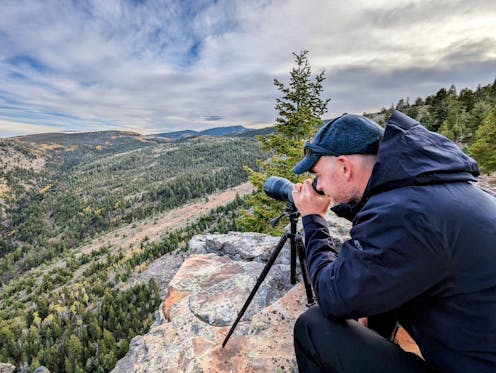
The only howl I heard on a recent walk across the Garron plateau in the Glens of Antrim, Northern Ireland, was from a bitter, biting wind. But 300 years ago, the howls would most definitely have been lupine: this place was home to one of the last wolves in what is now the UK. The species clung on in other parts of Ireland until the late 18th century.
Lynx and bears probably disappeared from both islands much earlier, despite debates over the potential presence of lynx in early modern Scottish texts.
In Ireland, the evidence for lynx rests on a single bone from almost 9,000 years ago. But much more recently than this, wolves did not simply vanish from our lands – we got rid of them. We did so less because our ancestors read too many fairy tales, more because of a confluence of political and economic factors.
As a political ecologist, I’m fascinated by how environmental change is strongly shaped by power dynamics and economic forces. This political ecology helps us understand our relationships with large carnivores across these islands – past, present and, potentially, future.
To investigate what’s really behind the controversy that surrounds large carnivore reintroductions to Britain and Ireland, I spoke to people on the frontline of this debate – the farmers and conservationists – for my new report. Their answers were illuminating.
An easy assumption to make is that farmers think lynx and wolves would pose a threat to their livestock, especially sheep – but the conflict of interests is more nuanced. There are issues about everything from who might pay for the upkeep of any guard dogs or electric fencing, to which rural landscapes are considered wild enough for large carnivore reintroductions.
To explore different perspectives on this, including options for successfully managing the reintroduction process to minimise the risks to livestock, I interviewed all of the five main farming unions across both nations, as well as two key livestock organisations. For balance, I asked the same questions to three rewilding organisations too.
Several farmers outlined why the biggest issue in predator-proofing their farming system would be the additional labour involved. Another rewilding expert emphasised the potential of tourism, provided there were mechanisms in place to ensure these benefits were shared with livestock owners.
A confluence of political and economic factors are key to understanding the controversies surrounding the potential return of wolves to Britain and Ireland, alongside that smaller, solitary and less polarising candidate for reintroduction, the lynx.
Ecological reasons may be cited as the main rationale for reintroducing either species, especially to control deer and encourage nature restoration. But it is issues of power and money that will largely dictate whether these proposals become reality, including current consultations on lynx reintroductions in England and Scotland.
Three steps towards compromise
First, get perspective. The political and economic uncertainty of post-Brexit Britain and Europe, including priorities and funding of agri-environmental schemes, occupied much of the discussions for my report. So too did a wariness among farmers of the roles of both governments and conservation charities in any reintroduction process. As National Farmers’ Union Cymru’s Hedd Pugh noted:
Whoever wants to reintroduce these species will promise the world but … down the line … the people who made the promises will have moved on, and the politicians will have changed too.
Second, management. There is a suite of tools available to manage coexistence between large carnivore conservation and livestock farming, including deterrence (such as fences, livestock guarding animals or shepherding), finance (compensation and insurance schemes), force (including removing or culling problem animals), and enterprise (including tourism and certification) options.
My report’s five cases studies, from western Europe and North America, explore these approaches in detail. These methods can work but their implementation is often complex, contested and costly. Unsurprisingly, there was limited enthusiasm for them among British and Irish farmers. Logistical, ethical and economic concerns were all discussed.
The need for governance was the third element of our discussions, and the only one where a sliver of common ground between farmers and rewilders emerged. This included the desire for guidelines that outline best practice for reintroductions, as well as for consultations with farmers and landowners.
Multi-perspective working groups, such as Lynx to Scotland’s lynx focus group, were cited as examples of effective governance. However, as Alastair Driver, director of the conservation charity Rewilding Britain, pointed out: “If we are to restore nature and tackle climate change at the level we need to, we can’t please everyone.”
In Ireland, wolves were once seen as barriers to the Cromwellian settlement of parts of the island. Earlier in Britain, they were definitely perceived as threats to royal hunting, and probably to monastic wool interests. Either way, wolves were political animals – contested symbols of contested visions for the land. They still are.
The wolves may be long gone from the Glens of Antrim and similar places across Britain and Ireland. But political animals – of the human variety – remain. As do the incessant push and pull of economic forces. Much more than ecology alone, this will define whether wolves and lynx return to such places in the coming decades, just as it defined their departure from them.

Don’t have time to read about climate change as much as you’d like?
Get a weekly roundup in your inbox instead. Every Wednesday, The Conversation’s environment editor writes Imagine, a short email that goes a little deeper into just one climate issue. Join the 30,000+ readers who’ve subscribed so far.
Jonny Hanson received a Nuffield Farming Scholarship to enable this research, funded via the Thomas Henry Foundation.
This article was originally published on The Conversation. Read the original article.







